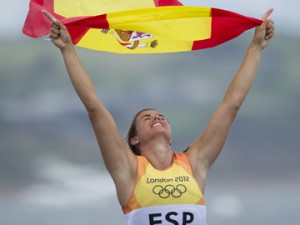
One of the great enigmas of this summer in Spain, apart from the future of the economy, has been the country’s performance at the Olympics, belying the received wisdom that it is a world power in sport.
As I write this, Spain sits 21st in the medal table, having finally won a gold, in the women’s windsurfing, 11 days into the Games, followed by a second in taekwondo. The medal haul so far of two gold, six silver and one bronze is puzzlingly poor.
Spain is the reigning football world and European champion, the current Davis Cup champion (its fifth title in the last decade), its cyclists have won the Tour de France three times in the last five years, and its basketball players, many of who play in the NBA, won the world title in 2006 and the European title in 2009 and 2011. This is the CV of a country well and truly on top of its game.
And yet, the London Olympics have been a flop for Spain. Admittedly, there have been one or two mitigating circumstances, with Rafa Nadal’s absence from the tennis due to injury being the most obvious. Also, Spain’s track and field athletes have clearly suffered from a lack of funds and attention – issues examined in a previous article here.
Windsurf gold medal winner Marina Alabau also offered a hint of the discontent simmering among some of the “fringe” sports when she said the Spanish federation “should be ashamed of itself” for failing to support athletes more.
But perhaps the most striking thing about all this is not simply that for the first 10 days of the Games Spain was sitting below Grenada in the medals table, but that this lack of success seems to have propelled the country back to a time and a mindset when it wasn’t a nation of winners, but rather a nation of unlucky, complaining losers.
In an opinion article titled ‘Spain under Sod’s Law’, AS’s Alfredo Relaño highlighted the fact that Nadal was not competing, as well as cyclists Samuel Sánchez and Óscar Freire. As for Spain’s massive upset in the football, in which the team failed to score a goal and went out before reaching the knockout stage, Relaño lays most of the blame on the fact that the team hit the goalpost three times and on “poor refereeing.” “The bread always falls on the floor butter-side down,” he moaned.
Relaño is hardly known as an objective voice, given his position as Real Madrid and Spain’s cheerleader-in-chief, but it’s disheartening to see someone of his supposed authority basically blaming Spain’s London 2012 debacle on a spot of bad luck. AS’s sour follow-up to the football elimination was to run a readers’ poll on whether football should no longer be an Olympic sport (58 percent agreed).
All this is a throwback to the days when Spain didn’t have the world’s best football team and legions of world-class athletes in other sports, something reflected in the fact the country often seemed to present itself as a constant victim of circumstance. In that era, when Spain’s greatest enemy it seemed was bad fortune, an Italian elbow in the face of footballer Luis Enrique in 1998 was cited as the reason Spain did not progress further in the 1994 World Cup, and similarly, a dodgy refereeing decision conspired against the team in 2002.
But Andrés Iniesta, Iker Casillas, Nadal, Fernando Alonso and Alberto Contador seemed to usher in a new era, when the Spanish sports star took fate into his own hands and triumphed, whatever the odds.
Beware triathlete “mercenaries”
But the last week or so has seen the old they’re-out-to-get-us mentality creep back as the medal count has remained frustratingly low. Tuesday’s triathlon, in which Javier Gómez Noya did superbly to win silver, saw the Spaniard up against an international conspiracy, according to El Mundo. Not only was British gold medal winner Alistair Brownlee in cahoots with his bronze-winning brother Jonny, but “mercenaries”, including a Russian and a Slovakian were “working against the Spaniard”, the newspaper complained.
The same day, the Spanish men’s hockey team was outraged by a refereeing decision at the end of their game against Great Britain, after a short corner was given and then disallowed. “It’s regrettable, shameful and shouldn’t be allowed to happen at the Olympic Games,” said Spanish coach Dani Martín.
If you throw in (no pun intended) a similar complaint by the Spanish men’s waterpolo team over a referee’s decision to disallow a last-minute goal against Croatia, doesn’t it look rather like a pattern is emerging?
But at least El País took a long hard look in the mirror after the football disaster in London and the excuse-fest that followed and offered a blunt appraisal:
“There’s one thing worse than losing at sport: the excuses, complaints, subterfuge, and the overall mediocrity that Spanish football seemed to have overcome after a century in the dark ages. The reaction of Spain following its football debacle in the Olympic Games has reminded us of the bad old days.”
And you could add: it’s not the losing that matters, it’s how you lose.
Leave a Reply
You must be logged in to post a comment.